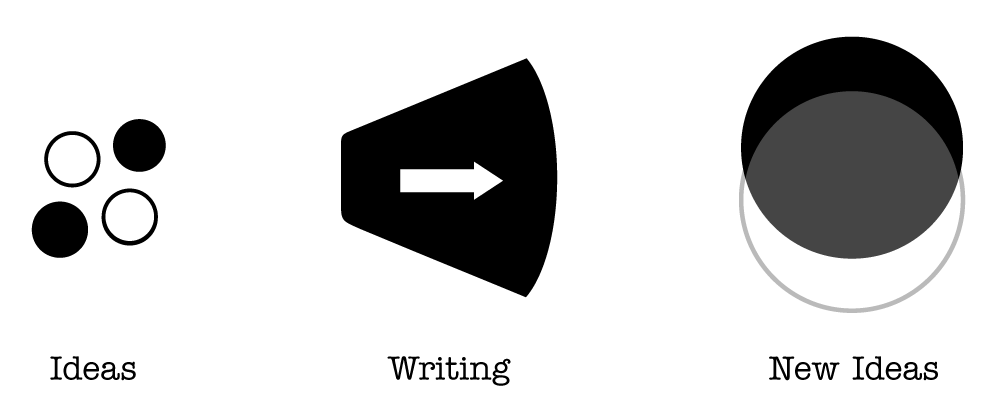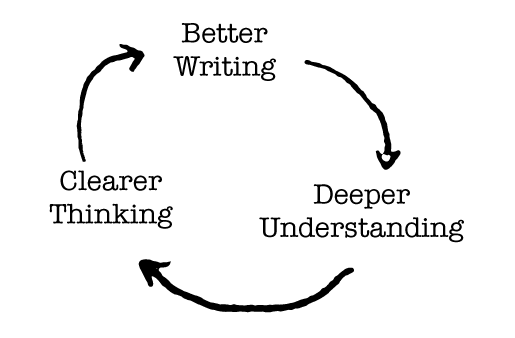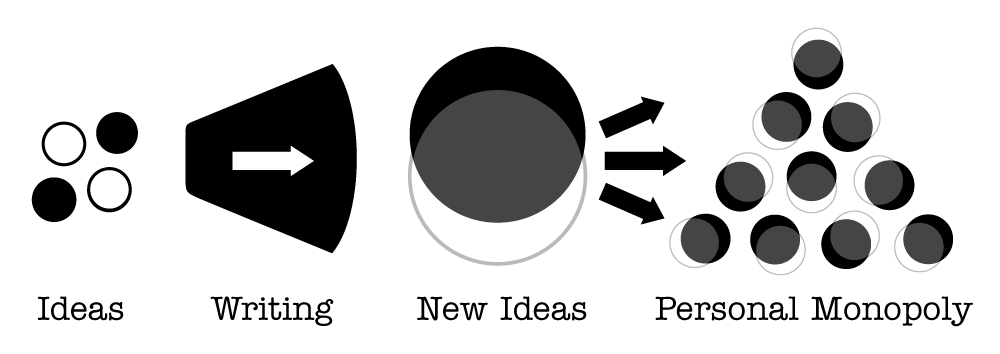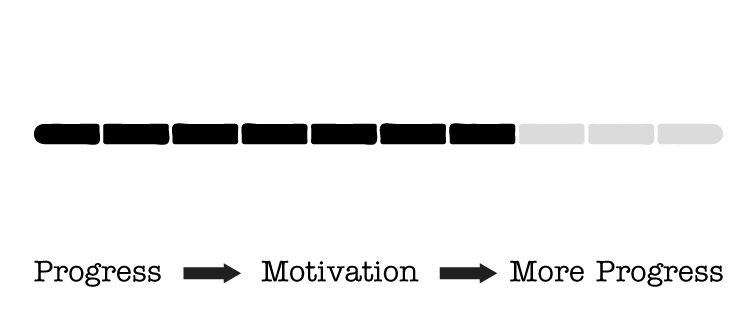This tweet from Jack Butcher embedded itself into my brain last month.
"If you think every day, write every day."
COVID has accelerated the adoption of remote work. Those who are unable to differentiate themselves will face more competition than ever. It has never been more important to differentiate yourself. Ultimately brand means different.
To escape competition you need to find that thing, or that unique combination of things, that you love and know better than anybody else. That is your unique differentiation. That is your personal brand.
Writing is the best way to both discover and establish your personal brand because it helps you discover how you think, what you think, and why others should care.

Writing is the mechanism of both the creation and distribution of value.
The problem is I'm ADHD and borderline on perfectionist when it comes to writing. This can be an asset in a startup but it's an awful combination when it comes to "personal brand" writing endeavors.
Startup Blogging vs Personal Brand Blogging
High writing standards work really well for growing startups.
I have always abhorred the "publish a lot and see what sticks" approach. The idea of spending precious time on anything that doesn't have a high probability of seriously moving the needle stresses me out. Instead, I like to take a sniper approach and selectively work on high-value opportunities that compound over time.
Despite scaling my last startup almost exclusively through content and inbound leads, I didn't publish very frequently. We only published about 1 article per month between all of us. I personally only published ~8 articles over a period of 2 years, after which point we were acquired.
We generated tens of thousands of leads and millions of dollars in enterprise value from just a handful of articles.
Now, why am I telling you this? Well, aside from shamelessly scratching my need for validation, it's to illustrate why I have failed in my own "personal brand" writing endeavors.
While helping other startups here in Utah through speaking engagements and more organic discussions has been incredibly gratifying, I've struggled to publish that same content online.
I'm starting to realize the writing approach that worked so well for growing startups is bad for "personal brand" writing. Especially when starting out. The goals behind writing for a startup vs writing for your personal brand are fundamentally different.
When writing to grow a startup you should aim to publish the best resource on a given topic by a factor of 10.
The primary goal of publishing within a startup is to:
- Be the #1 authority.
- Rank well for SEO.
- Look polished.
- Be comprehensive.
- Differentiate.
- Optimize for conversion.
- Ultimately generate leads.
On the other, hand the goal of personal brand writing is to:
- Clarify your unique thoughts (practice your craft.)
- Help others clarify theirs (show your craft.)
- Attract and meet likeminded people (create meaningful relationships.)
Now of course there is overlap and you want your personal brand content to be polished, comprehensive, authoritative and all that jazz. But you have to recognize that there are different constraints when writing for your personal brand.
1 Time Constraints
Unlike a post you might write for your startup, you can't dedicate a full-time effort to a personal blog post. The time just isn't there.
Yet foolishly, that's exactly what I tried to do. In the end, I was overwhelmed. You just can't squeeze such lofty standards through the bottleneck of a side project. Or at least I couldn't.
If you're too picky, you won't publish enough. If you don't publish, you will stall out and your motivation to keep writing will collapse.
Writing forces you to understand and clarify your thoughts.
So anything you can do to write more will deepen your understanding and clarify your thinking, which makes you a better writer, which increases your motivation to write, and on and on.

Besides that, I know that I will deeply regret it if I don't write and share the unique tactics and insights I've developed over the years.
2 Your Personal Monopoly
In a startup, you typically have a list of keywords that you want to go out and own. You need an original angle but it's often a question of how to write the best, most comprehensive content to rank for a set of high-value keywords.
Writing for your personal brand is different. There may be keywords you want to own and that's great. But it's just as much about exploring your curiosity as it is about sharing your expertise.

It's easier to create a personal monopoly where you have no competition. The best way to do this is to combine ideas that have never been combined before. This is easiest if you operate at the frontier of emerging technologies and trends.
There are trillions of searches on Google every year [...] 15% of searches we see every day are new...
—Google
SEO strategy and keyword research are most relevant to ideas that have already emerged. Everyone has a unique combination of strengths, curiosities and personality, the cultivating of which leads to unique skills and viewpoints. If you're writing your own, authentic insights, they often won't fit in a neat box of SEO keywords. You have the opportunity to give birth to concepts and ideas before they become someone else's keyword research.
Done right, writing means discovery, creativity, and experimentation.
Writing gives you a path to sharing, discovering, and developing your own high-value skills and ideas, the product of which is your own personal monopoly.
How to Keep Your Motivation High
I'm ADHD. I get obsessed with learning all sorts of new topics but easily lose interest in writing about them.
If you're anything like me, when you first start on a new project or endeavor, you've got a few weeks before the initial excitement starts to go stale. So you've got to ride that wave of novelty and curiosity into a deeper source of motivation.
The most motivating thing in the world is a sense of progress. There's plenty of research to back that up. So it's essential that you start to build a positive feedback loop where your effort turns into progress, which turns into motivation, which turns into more effort.

So don't scope creep your articles into something so monstrous and overwhelming that you can't publish something before the initial wave of excitement drains away. This has been my biggest struggle.
Aim for something small in scope and make it amazing. Break large endeavors into smaller chunks. Publish the smaller chunks. You can always interlink them together or combine them into a super article in the future.
Above all, focus on the aspects that are fun for you and minimize the parts that aren't.
Ask yourself:
- What would this look like if it was fun?
- What would this look like if it was easy?
Even though I love SEO and conversion, I am slowly learning to stop obsessing about them because it slows me down and keeps me from getting that sweet dopamine hit that comes from progress.
I'll circle back to articles that get traction and think about adding those things if it ever makes sense.
You don't have to obsess about publishing the most comprehensive resource on the internet. Instead, focus on having a unique point of view and sparking new ideas (aka be interesting.)
Write to learn, share original insights, show your mistakes, and people will stay for more.
If any of this resonated with you, I'd love to share more with you. Join my newsletter and I'll share my best tactics and insights for growth, productivity, tech, psychology and more. You'll get the highs, the lows, and the unvarnished truth.

